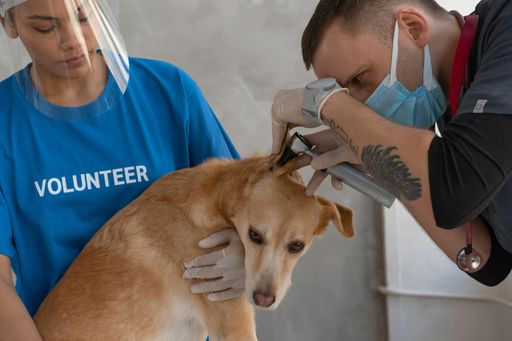Pet owners want their pets to be healthy and content. Numerous health conditions, including mouth pain, can affect dogs. From gum disease to dental fractures, oral pain can result in discomfort, eating difficulties, and even behavioral changes.
Dog caretakers must identify and treat oral discomfort. This article discusses the diagnosis and treatment of canine oral pain. If you are concerned about your dog's oral health, continue reading to learn how to identify and treat oral discomfort.
How to Treat Oral Pain in Dogs
Medications
Oral pain in canines can be treated with medications alone or in conjunction with extractions or restorative therapies. Carprofen and meloxicam reduce oral inflammation and discomfort.
Antibiotics can be used to treat infections and post-dental problems. In extreme cases, opioids such as morphine and fentanyl may be used for short-term pain management, despite their potential to induce drowsiness and respiratory depression.
Follow the veterinarian's instructions and monitor adverse effects when administering pain medication. Regular dental examinations can detect and treat oral health problems early, reducing the need for analgesics.
Strengthening Dog’s Teeth
Using nylon bones to strengthen a dog's teeth effectively treats oral pain in dogs. The durable, textured surface of nylon bones helps clean teeth and massage gums, promoting dental health. Chewing on these bones reduces the risk of dental diseases by removing plaque and tartar.
Chewing on nylon bones for dogs can help strengthen the muscles in the mandible (jaw) through the repetitive chewing action. It can alleviate oral discomfort, making it an excellent option for canines with toothaches or teething puppies. Regular use of nylon bones can contribute to a dog's overall dental hygiene and promote a pain-free muzzle.
Natural Remedies
Oral discomfort can be relieved by natural remedies. Cold compresses or ice blankets can alleviate inflammation and swelling around the mouth. To relieve dental discomfort, apply chamomile tea that has been cooled with a cotton ball. Dogs can use coconut oil to reduce inflammation and enhance oral health.
Additionally, peppermint, rosemary, and sage can be used topically or in homemade mouthwashes to relieve oral pain. Consult a veterinarian before using natural remedies; some may cause adverse effects or interact with other medications. In severe or persistent oral pain cases, extractions or restorative procedures may be required in addition to natural remedies.
Professional Cleaning

Professional canine dental care can prevent and reduce dental discomfort in dogs.. A veterinarian scales the teeth to remove tartar and plaque and polishes the surface to flatten it. Professional cleanings can prevent oral pain-causing periodontal disease, tooth decay, and fractures in canines. In addition to professional cleanings, owners can contribute to their dog's oral health by brushing their teeth and providing suitable chew items. Regular dental examinations can detect and treat oral health issues in their earliest stages, reducing oral discomfort and complications.
Extractions
If a dog's tooth is infected, severely damaged, or causing significant discomfort, it may need to be extracted. Under general anesthesia, the dog's tooth is meticulously extracted using dental instruments. After surgery, analgesics and antibiotics may be administered to the dog.
Extractions can relieve mouth discomfort and prevent complications, but you must adhere to your veterinarian's recovery instructions. Extractions may be part of a comprehensive periodontal disease treatment regimen.
Tips on How to Recognize Oral Pain in Dogs
Behavioral Signs
The behavior of a dog may indicate oral discomfort. These include decreased activity, impatience, unwillingness to play, and increased napping. Additionally, dogs may become aggressive when their mouths are handled.
Dogs with oral discomfort may paw at their mouths, drool, and rub their faces. Dog owners should document abnormal behavior and seek veterinary care if oral pain is suspected.
Physical Signs
A dog's owner or veterinarian may observe multiple symptoms of oral discomfort. Examples include red, irritated, bleeding gums, loose teeth, tartar buildup, and a bad odor. Additionally, dogs may refuse to consume food or experience pain or discomfort when eating.
In extreme circumstances, dogs may develop swollen canines or faces, pus discharge, or oral tumors. A veterinarian should treat these symptoms of oral health disorders to alleviate pain and prevent further complications.
Changes in Appetite and Eating Habits
Oral discomfort may alter a dog's appetite. Oral discomfort may discourage canines from eating. They may also favor softer foods or prefer to consume them on one side. If toothache inhibits a dog from eating, it may experience weight loss. When dogs stop eating for an extended period of time , owners should transport them to the veterinarian.
What are the causes of oral pain in dogs?
Periodontal Disease
Periodontal disease, which causes inflammation and infection of the gums, is a frequent cause of oral discomfort in dogs. Without treatment, periodontal disease can result in tooth loss and other health complications.
Canine periodontal disease can result in bad breath, swollen gums, unstable teeth, and chewing difficulties. Treating periodontal disease with professional teeth cleansing, antibiotics, and tooth extractions is possible. Periodic dental exams and at-home dental care, such as brushing and dental treats, can prevent periodontal disease in dogs.
Tooth Fractures and Cavities
Cavities and fractures could cause toothaches in dogs. Trauma or chewing on complex objects can cause tooth fractures, exposing the tooth's sensitive interior layers and leading to pain and infection.
Mouth bacteria produce acid that erodes tooth enamel, resulting in cavities. Cavities can cause tooth fractures and discomfort. Dogs with tooth fractures or cavities may experience difficulty eating, mouth pawing, and sensitivity to hot and chilly food.
Fractures or cavities in teeth could necessitate dental bonding, crowns, or extractions. Dogs can avoid tooth fractures and cavities with regular dental exams and good oral hygiene.
Oral Tumors
Oral tumors are uncommon but significant causes of oral pain in dogs. Tumors of the mouth and pharynx can be benign or malignant. Oral tumors can result in eating difficulties, drooling, bad odor, swelling, and bleeding.
Biopsies determine tumor classification. Oral malignancies may be treated with surgery, radiation therapy, chemotherapy, or a combination. Owners should contact a veterinarian immediately if their companion exhibits unusual mouth symptoms. Early diagnosis is crucial for the treatment of canine oral malignancies.
Trauma or injury
Trauma can cause muzzle pain in dogs. Accidental falls and conflicts can injure our precious dogs. Trauma can result in dental fractures, jaw dislocations, facial lacerations, and contusions.
When stroked, dogs may experience swelling, bleeding, difficulty eating, and discomfort. Oral injuries may necessitate pain management, antibiotics, and surgery. Dog owners should seek veterinary care for muzzle or facial injuries to reduce pain and repercussions.
Conclusion
The health of dogs is dependent on recognizing and treating mouth discomfort. As pet caretakers, we must care for the teeth and gums of our pets.
We can detect and treat oral pain in dogs early on. The causes of oral pain determine the appropriate treatment. Immediately consult a vet if you believe your dog is experiencing oral distress. Proper care lets your pet be joyful, healthy, and pain-free.
FAQs
When should I take my dog to the vet for oral pain?
If your dog is experiencing oral pain, you should transport them to the veterinarian. Consult a veterinarian if your dog's oral discomfort is severe, lasts more than a few days, or is accompanied by vomiting or lethargy.
How can my veterinarian treat my dog's toothache?
The treatment for your dog's oral discomfort depends on its cause. Antibiotics for infections, dental extractions, or root canals for tooth decay or injury.
How can I prevent oral irritation in my dog?
Good oral hygiene, a nutritious diet, and regular visits to the veterinarian can prevent oral pain in dogs. Dental candies and toys can help keep your dog's teeth and gums clean between veterinary visits.



















